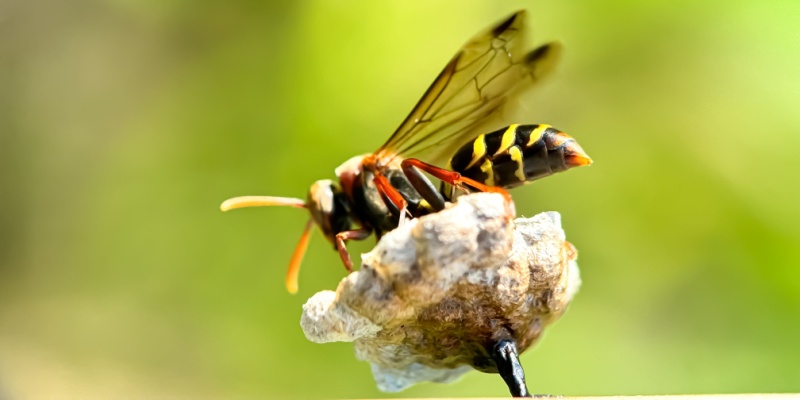When summer arrives in Indianapolis, it brings backyard barbecues, blooming gardens, and unfortunately, an uptick in stinging insects. These unwelcome guests can cause more than just a painful sting—they can also trigger serious allergic reactions and disrupt your outdoor activities. Understanding the differences between common stinging insects like wasps, yellowjackets, and hornets is essential to keep your family and property safe.
At Trio Pest Control, we specialize in helping Indianapolis homeowners identify and eliminate these pests quickly and safely. Here’s what you need to know to tell them apart and when it’s time to call in the professionals.
Wasps: The Slender Solitary Invaders
Wasps are perhaps the most common stinging insects encountered around homes and gardens. Typically slender with narrow waists and smooth bodies, wasps come in a variety of colors depending on the species, though many are black with yellow or orange markings.
- Body: Smooth and shiny, with a very narrow “waist” between thorax and abdomen
- Behavior: Wasps can be solitary or social, and they’re known for building paper-like nests in sheltered areas like eaves, attics, and trees
- Aggressiveness: Generally less aggressive than yellowjackets or hornets, but will sting when threatened
Paper wasps, one of the most common types in Indianapolis, are beneficial for gardens because they feed on caterpillars and other pests. However, their proximity to homes makes them a concern, especially when their nests are disturbed.
Yellowjackets: The Aggressive Foragers
Yellowjackets are often mistaken for bees because of their similar coloring, but make no mistake—these are among the most aggressive stinging insects in Indiana. They are stockier than wasps and have black and bright yellow stripes.
- Body: Shorter and thicker than wasps, with a bold yellow and black coloration
- Behavior: Highly social; nests can house thousands and are typically underground or in wall cavities
- Aggressiveness: Extremely territorial and quick to sting, especially when food or nests are threatened
Yellowjackets are drawn to sugary drinks, fruits, and meat, making them a common nuisance at picnics and cookouts. Their underground nests can also be difficult to detect until it’s too late. If you see multiple yellowjackets in the same area, there’s likely a nest nearby, and professional removal is recommended.
Hornets: The Intimidating Giants
Hornets are a type of wasp but deserve special attention due to their size and aggression. The most common in our region is the bald-faced hornet, which is actually more closely related to yellowjackets than to true hornets.
- Body: Larger than wasps and yellowjackets, usually with black and white markings
- Behavior: Builds large, enclosed, football-shaped nests typically hanging from trees or buildings
- Aggressiveness: Very protective of their nests and will sting repeatedly if disturbed
Bald-faced hornets are especially active in late summer and early fall. Their stings are more painful due to the amount of venom they inject, and they can sting multiple times without losing their stinger. Their large aerial nests are highly visible and should never be approached without proper equipment and training.
Why Proper Identification Matters
Understanding which type of stinging insect you’re dealing with is crucial for safe and effective removal. Misidentifying them can lead to inappropriate control methods and increase the risk of stings. Some homeowners try DIY solutions, but these often backfire, especially with aggressive species like yellowjackets and hornets.
That’s where Trio Pest Control comes in. Our experienced technicians are trained to correctly identify the species and locate nests, using targeted treatments that eliminate the colony without putting your family at risk.
Preventing Stinging Insect Infestations
Here are a few proactive steps to reduce your chances of encountering stinging insects:
- Seal entry points: Repair holes or gaps in siding, roofing, and screens to prevent indoor nesting
- Cover food and drinks: Always cover sugary beverages and dispose of food waste promptly
- Remove standing water: Eliminate any water sources that may attract insects
- Regular inspections: Schedule seasonal inspections with a pest control expert to detect early signs of nests
Trust Trio Pest Control to Keep Your Home Safe
Encountering wasps, yellowjackets, or hornets in your yard can be frightening, especially if you have young children or family members with allergies. Don’t take the risk of handling these pests on your own. At Trio Pest Control, we use safe, effective techniques to eliminate stinging insects and prevent future infestations.
If you spot a nest or notice increased insect activity around your home, contact us today for a free consultation. Let us help you reclaim your yard and enjoy a sting-free summer in Indianapolis!
